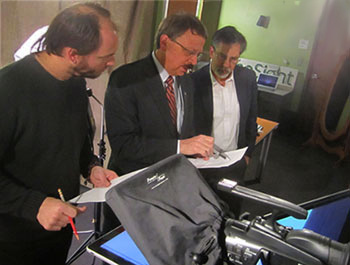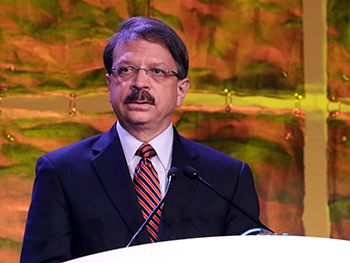A surgical complication on a cataract patient he treated early in residency has shaped the career of Gregory L. Skuta, MD. The experience was devastating for both patient and physician. After an expulsive suprachoroidal hemorrhage, the patient lost all vision and his eye, despite the doctors’ best efforts.
Yet remarkably, after the patient’s discharge from the hospital, he wrote his physicians, thanking them for his wonderful care. “I was humbled by this touching act,” said Dr. Skuta. “As a result of this experience, I’ve never forgotten the importance of standing by our patients, especially when they are experiencing major adversity or loss of vision.”
This commitment to patient care has defined Dr. Skuta’s subsequent career. “He’s the clinician we all wish we had for a personal doctor,” said Academy Executive Vice President and CEO David W. Parke II, MD, who worked with Dr. Skuta at the Dean McGee Eye Institute before joining the Academy. “He is concerned about and devoted to each and every patient.”
___________________________

Dr. Skuta prepares to shoot a video for Academy members. Photo: Christi A. Foist
As Dr. Skuta assumes the reins as Academy president this month, he brings dedication to both patients and the profession of ophthalmology. Throughout his career, he’s served as a leader to many ophthalmic organizations — from Dean McGee and the American Glaucoma Society to the Academy, where he helped improve ophthalmic education through prior roles as chair of the Self-Assessment Committee, Secretary for Ophthalmic Knowledge and Senior Secretary for Clinical Education.
As many residents can already attest, young ophthalmologists will be hard pressed to find another Academy leader with such a keen focus on their own interests. “After I became chair at DMEI, Dr. Skuta was the first new faculty member I recruited,” said Dr. Parke. “He immediately became a critical source of mentoring to residents. And in ensuing years, he became one of a small group of faculty to whom residents regularly turned for advice on blending professional and personal lives.”
In an interview with YO Info this month, Dr. Skuta offered a peek at what young ophthalmologists can expect from his tenure.
YO Info: What should young ophthalmologists know about you as Academy president?
During more than 20 years of Academy service, my desire has always been simply to “give back” to a profession that has provided me with remarkable opportunities and a deep sense of satisfaction.
And although I have been heavily involved in professional advocacy activities, both nationally and in the state of Oklahoma, much of my formal Academy effort has been devoted to educational programs for practicing ophthalmologists and ophthalmologists in training.
I’ve been delighted with the Ophthalmic News & Education (ONE®) Network. It’s such a robust educational tool that has really helped transform ophthalmologic education and expand our reach to international colleagues. I’m also particularly proud of how the Academy continues to recognize the importance of engaging young ophthalmologists through the Advocacy Ambassador Program and the YO Committee.
Moving forward, we are in the process of reevaluating the current structure of our residency education programs to ensure that we are as efficient and effective as possible in meeting society’s future eye care needs.
YO Info: Were there any particular individuals responsible for guiding you on your path towards becoming Academy president?

Dr. Skuta during the 2013 Academy Annual Meeting in New Orleans.
I have to say that upon beginning my tenure of service to the Academy years ago, I would never have anticipated the honor of one day serving as president of this absolutely outstanding organization. I am deeply grateful for this very special privilege.
I am also grateful to the many individuals who have mentored me along the way; however, I particularly appreciate past Academy president Thomas Weingeist, MD, PhD, from the University of Iowa for first asking me to serve on the Self-Assessment Committee in 1989 and for providing support and wise counsel over the years. Past Academy president Paul Lichter, MD, who was my first “boss” at the University of Michigan, also played a pivotal role in my involvement with the organization, as did Dr. Parke, my department chair at the University of Oklahoma.
YO Info: Do you have a favorite mentor or teacher from early in your career?
I have been extremely fortunate to have a number of great mentors during my time in ophthalmology and wish that I could list them all.
However, the mentor who most influenced my career is Dr. Richard Parrish II, who had recently joined the faculty at the University of Miami when I became a glaucoma fellow at the Bascom Palmer Eye Institute in 1985. He really instilled in me the importance of intellectual and academic integrity and perseverance as well as mentorship to his fellows and engagement in medical and ophthalmic education.
At that time, he was overseeing the landmark Fluorouracil Filtering Surgery Study and cultivated my interest in wound healing and glaucoma-filtering surgery. And this influence paved the way for my and others’ investigations into the role of mitomycin in enhancing the success of glaucoma-filtering surgery — which has subsequently impacted the management of glaucoma for a number of years.
YO Info: What drives your own passion for ophthalmology?
I am deeply passionate about the importance of service to the profession of ophthalmology, which has provided truly incredible opportunities to all of us. Ophthalmology is the most extraordinary and rewarding specialty in all of medicine, and as ophthalmologists, we have such a special opportunity to positively impact the lives of our patients on a daily basis.
And as the head of a large eye institute and academic department at Dean McGee and the University of Oklahoma, I am dedicated to advancing our patient care, educational and vision research programs as well as the personal and professional aspirations of our faculty members, residents, fellows and staff.
YO Info: What advice would you give young ophthalmologists as they navigate their careers?
We recently completed our interviews at the University of Oklahoma for the entering residency class of 2015, and I was extremely impressed with the outstanding quality of the medical students entering ophthalmology.
This process reminded me in a very meaningful way of why we choose to become ophthalmologists and the passion behind that choice. So, if I could offer any advice, it would be to sustain that enthusiasm throughout their careers and to always commit themselves to engagement in and service to the profession and to society at large. Such a commitment to service brings its own set of benefits and rewards as well as a deep sense of satisfaction.
___________________________
Editor’s note: For more from Dr. Skuta, read his “Joys of Service to the Profession” in January’s EyeNet.
* * *
About the author: Mike Mott is a contributing writer for YO Info and a former assistant editor for EyeNet Magazine.